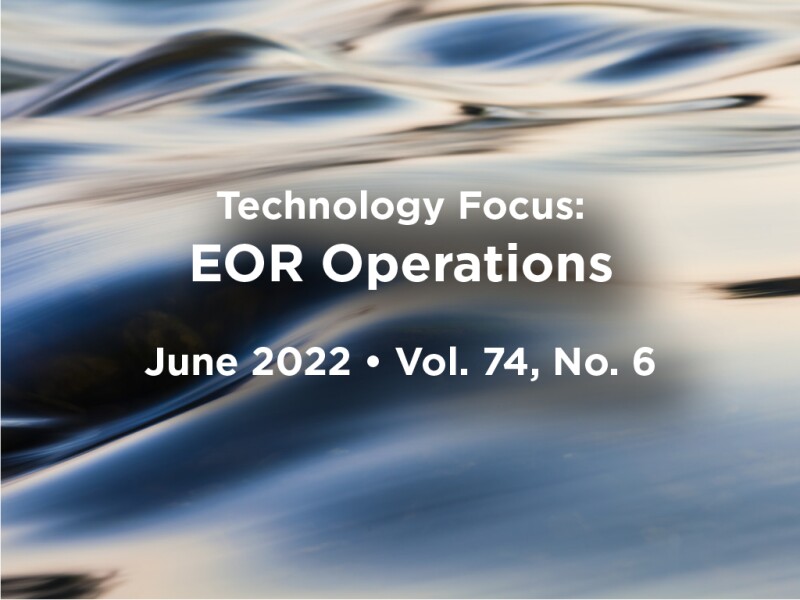In this article, I will focus on chemical enhanced oil recovery (EOR). What is its current status, and what is its future? Chemical EOR is defined as the addition of a chemical to injection water for enhancing oil recovery. Typically, and traditionally, there are three types of chemicals added to water: polymers, surfactants, and alkalis.
In simple terms, the polymers increase the viscosity of injected water, thus improving its mobility, similar to adding a small amount of corn starch to thicken soups. The surfactants reduce the interfacial tension (IFT) between the oil and water, dislodging the stuck oil, similar to how a laundry detergent works in our washers to clean our clothes. Alkalis are surfactant-forming compounds that react with the organic material in the oil and form surfactants in situ. The surfactants then reduce the IFT and enhance recovery.
Chemical EOR has been practiced since oil was discovered and water was injected to produce it. The world produces less than 1 million BOPD from chemical EOR. The bulk of this (more than 80%) is from polymerflooding for mostly medium to heavy oils. Surfactants and alkalis have been tested, but their field performance has been poor. They perform extremely well in experiments and laboratories. Up to 100% of the oil can be produced in the laboratory using surfactants, if enough pore volumes are injected.
Therein lies the first clue as to why surfactants have failed. Too many pore volumes are needed. The main reason is adsorption on the rock surface. Most of it is adsorbed, and it does not propagate far enough into the reservoir for it to perform its magic. Another reason is its degradation in harsh reservoir conditions. A third reason is economics and the high initial investments for facilities.
Combination flooding including surfactant/polymer, alkali/surfactant/polymer, and others have been tried with limited success. In my humble opinion, chemical EOR equals polymer EOR, at least from a total-oil-production point of view. Some purists and scientists may disagree, but that’s all right.
The papers that follow are examples of polymer EOR from China, Europe, and Oman. One is an excellent paper that shares lessons learned from extensive polymerflooding experience in China. Another describes lessons learned from pilots in Austria. A third shares some of the challenges encountered in pilot-testing polymers from Oman.
The challenge for academia and research institutes is this: How can we make robust surfactants, reduce their adsorption on rocks, and reduce their cost? It’s food for thought for future researchers and graduate students.
This Month’s Technical Papers
Production-Technology Selection Optimizes Redevelopment Project in Austria
Polymerflooding Pilot Applied in Lower-Permeability Heterogeneous Sandstone
Study Reviews Recent Polymerflooding Advances in China
Recommended Additional Reading
SPE 200178 Polymer Stability at Harsh Temperature and Salinity Conditions by Tormod Skauge, Energy Research Norway, et al.
SPE 200166 Cost-Efficient Polymer Full-Field Development by Fast-Tracking Nap Concept in Horizontal Polymer Injectors by Faisal Saadi, Petroleum Development Oman, et al.

Sunil Kokal, SPE, is a principal scientist and a focus area champion of enhanced oil recovery on the Reservoir Engineering Technology team of the Exploration and Petroleum Engineering Center—Advanced Research Center at Saudi Aramco in Dhahran, Saudi Arabia. During the past 4 decades, he has been involved in applied-research projects on sustainability, enhanced/improved oil recovery, reservoir fluids, hydrocarbon phase behavior, crude oil emulsions, and production-related challenges. Kokal has spearheaded the implementation of the first carbon capture, utilization, and sequestration and CO2-EOR demonstration project that has received many firsts and 13 international awards. He is also working on an initiative on energy sustainability and circular carbon economy, a framework for reducing CO2 emissions from oil and gas. Kokal has written more than 150 technical papers and has authored two chapters for the SPE Petroleum Engineering Handbook. He has served as associate editor for the Journal of Petroleum Science and Engineering and the SPE Reservoir Evaluation & Engineering peer-reviewed journal. Kokal is a fellow of the Energy Institute, an Honorary Member of SPE, and the recipient of the prestigious 2018 IOR Pioneer award and several other international awards. He also served as an SPE Distinguished Lecturer during 2007–2008. Kokal holds a PhD degree in chemical engineering from the University of Calgary and a BS degree in chemical engineering from the Indian Institute of Technology, New Delhi. He can be reached at sunil.kokal@gmail.com.

